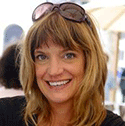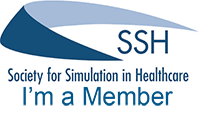How did you get into healthcare simulation?
I can only say it was dumb luck and great fortune on my part. I had finished a BS in biochemistry but had realized life in the lab wasn't quite for me - that I had

always liked the classroom teaching and learning part of science best. A part-time coordinator position in clinical education at the University of Washington in the classifieds caught my eye and I started in my first simulation lab over 20 years ago.
I was very fortunate to come in to the world of healthcare simulation, specifically, standardized patient simulation, just as it was poised to become a ubiquitous part of medical education. The educators who preceded me into this field (or better said, who invented it) were incredibly generous and gracious colleagues. I was a "program of one" at my own institution, which is the only medical school serving five western states, but I had help and support in developing both my program and my professional identity from a host of wonderful people.
Being so isolated geographically from those colleagues led me to develop and moderate the SP-Trainer listserv, now in its 19th year and with over 500 international subscribers. Participating in SP education discussions, projects, and presentations via the list led to the opportunity to serve as one of the founding board members (Membership) of the Association of Standardized Patient Educators in 2001 and to serve a second term on the board as Publications chair 2010-12. In 2012 ASPE honored me with their Outstanding Educator of the Year award during the annual conference, a day which I count among the best of my life.
I joined SSH in 2005 and have been involved in the effort to examine how SP education best fits under the wider healthcare simulation umbrella. I served for two years as the SP special interest group vice-chair and was elected as SIG chair at IMSH 2015. My two main personal goals as chair are increasing visibility for the SP education field in SSH, and helping our next generation of leaders start their trajectories within the organization.
What do you like most about healthcare simulation?
I love that it is a combination of creative arts and of science. There is never one perfect way to do any simulation, and there are always, always, new ideas to try

and problems to be solved. It's also something done in teams - all the way from the teams working on the curriculum pieces, to the simulation community at my institution, to the small SP squads that work directly with students. And as mentioned above, the terrific people in healthcare simulation worldwide that I get to interact with as part of my involvement in the field.
I also really value that every day I know exactly why I do what I do: to promote patient health and safety, to support my students to become the best practitioners possible, to be part of creating a space for discovery and innovation in healthcare. That serves as a lighthouse beacon during the stormy times.
What is most challenging about healthcare simulation?
I think it comes down to a lot of the usual challenges - not enough time, not enough people, not enough money, not enough space - most simulationists I

know are always scrambling to deal with several of these at once. The well-known secret is that a lot of us really thrive in this environment when there aren't utterly insurmountable problems. In fact, I would venture most simulations initially grew out of significant challenges that stimulated creative problem-solving.
With the knowledge gained through becoming certified, how has this transformed and benefited your work as a healthcare simulationist?
As someone who has always worked primarily in SP education, preparing for the certification exam was extremely useful in helping me understand many of the other simulation methodologies more fully. In particular, I am always hoping I'll get a chance to be involved in Serious Games sims! That's totally outside my experience, but it is fascinating, and I suspect there are several ways that the realms of SPs and SGs could fruitfully collaborate.
I'm also better able to advise my colleagues and clients about different types of simulation we could combine with SPs to expand our effectiveness. And having CHSE after my name definitely makes me feel like a real part of the wider SSH community.
I completed my CHSE during the 2012 pilot phase because I wanted to be able to describe the process to my SP education colleagues and to write about it for the ASPE newsletter. There are now several SP educators who are CHSE and CHSE-A, and a number of us will be among the first to go through the credential renewal process this coming year. I hope to be able to learn enough as I complete that to provide assistance to others as they approach theirs as well.
Creative License:
SSH SP SIG
Association of Standardized Patient Educators
University of Washington SP-Trainer